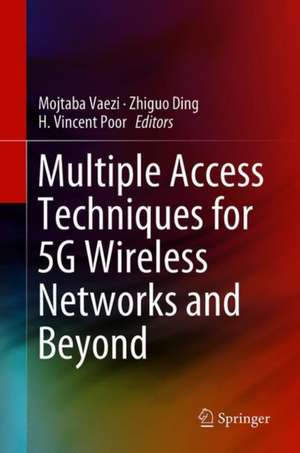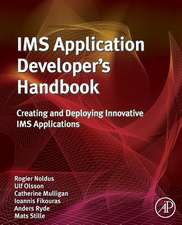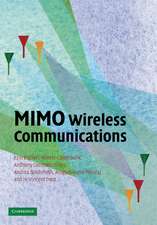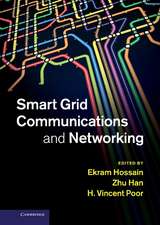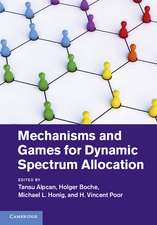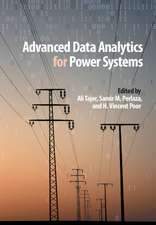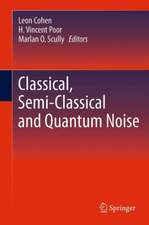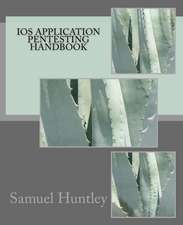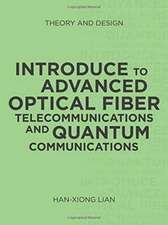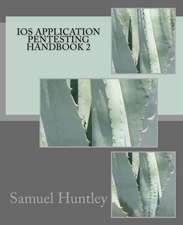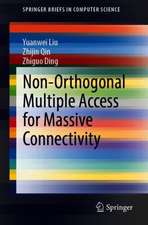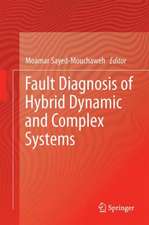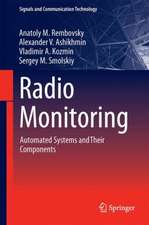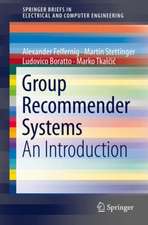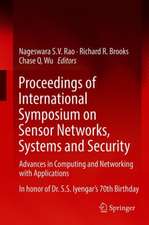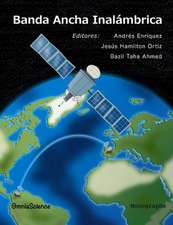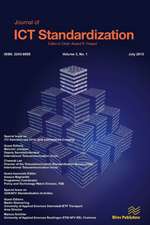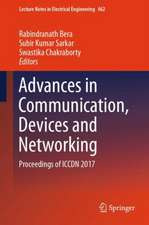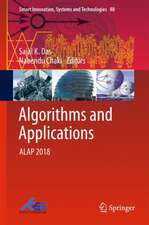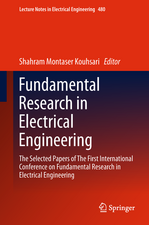Multiple Access Techniques for 5G Wireless Networks and Beyond
Editat de Mojtaba Vaezi, Zhiguo Ding, H. Vincent Pooren Limba Engleză Hardback – 4 sep 2018
| Toate formatele și edițiile | Preț | Express |
|---|---|---|
| Paperback (1) | 1127.46 lei 6-8 săpt. | |
| Springer International Publishing – 22 dec 2018 | 1127.46 lei 6-8 săpt. | |
| Hardback (1) | 1133.93 lei 6-8 săpt. | |
| Springer International Publishing – 4 sep 2018 | 1133.93 lei 6-8 săpt. |
Preț: 1133.93 lei
Preț vechi: 1382.84 lei
-18% Nou
Puncte Express: 1701
Preț estimativ în valută:
216.98€ • 232.02$ • 180.91£
216.98€ • 232.02$ • 180.91£
Carte tipărită la comandă
Livrare economică 18 aprilie-02 mai
Preluare comenzi: 021 569.72.76
Specificații
ISBN-13: 9783319920894
ISBN-10: 3319920898
Pagini: 490
Ilustrații: XXIII, 685 p. 298 illus., 209 illus. in color.
Dimensiuni: 155 x 235 x 47 mm
Greutate: 1.17 kg
Ediția:1st ed. 2019
Editura: Springer International Publishing
Colecția Springer
Locul publicării:Cham, Switzerland
ISBN-10: 3319920898
Pagini: 490
Ilustrații: XXIII, 685 p. 298 illus., 209 illus. in color.
Dimensiuni: 155 x 235 x 47 mm
Greutate: 1.17 kg
Ediția:1st ed. 2019
Editura: Springer International Publishing
Colecția Springer
Locul publicării:Cham, Switzerland
Cuprins
Introduction to Cellular Mobile Communications.- OFDM Enhancements for 5G Based on Filtering and Windowing.- Filter Bank Multicarrier Modulation.- Generalized Frequency Division Multiplexing: A Flexible Multi-Carrier Waveform.- NOMA: An Information Theoretic Perspective.- Optimal Power Allocation for Downlink Non-Orthogonal Multiple Access Systems.- On the Design of Multiple-Antenna Non-Orthogonal Multiple Access.- Non-Orthogonal Multiple Access For Millimeter Wave Networks.- Full Duplex Non-Orthogonal Multiple Access Networks.- Heterogeneous NOMA with Energy Cooperation.- Performance Analysis of NOMA in Vehicle-to-Vehicle Massive MIMO Channels.- Sparse Code Multiple Access.- Interleave Division Multiple Access (IDMA).- Pattern Division Multiple Access.- Grant-free Multiple Access Scheme.- Random Access versus Multiple Access.- Experimental Trials on Non-orthogonal Multiple Access (NOMA).- Non-Orthogonal Multiple Access in LiFi Networks.- NOMA Based Integrated Terrestrial-Satellite Networks.- Conclusions and Future Research Directions for NOMA.
Notă biografică
Mojtaba Vaezi received the Ph.D. degree in Electrical Engineering from McGill University in 2014. Since 2015 he has been with Princeton University as a Postdoctoral Research Fellow and Associate Research Scholar. He is currently an Assistant Professor of ECE at Villanova University and a Visiting Research Collaborator at Princeton University. Before joining Princeton, he was a researcher at Ericsson Research in Montreal, Canada. His research interests include the broad areas of information theory, wireless communications, and signal processing, with an emphasis on physical layer security and radio access technologies. Among his publications in these areas is the book Cloud Mobile Networks: From RAN to EPC (Springer, 2017). Dr. Vaezi has served as the president of McGill IEEE Student Branch during 2012-2013. He is an Associate Editor of IEEE Communications Magazine and IEEE Communications Letters. He has co-organized four international NOMA workshops at VTC-Spring’17, Globecom'17, ICC'18, and Globecom'18. Dr. Vaezi is a recipient of a number of academic, leadership, and research awards, including McGill Engineering Doctoral Award, IEEE Larry K. Wilson Regional Student Activities Award in 2013, the Natural Sciences and Engineering Research Council of Canada (NSERC) Postdoctoral Fellowship in 2014, and Ministry of Science and ICT of Korea's best paper award in 2017.
Zhiguo Ding received his B.Eng. in Electrical Engineering from the Beijing University of Posts and Telecommunications in 2000, and the Ph.D. degree in Electrical Engineering from Imperial College London in 2005. From Jul. 2005 to Apr. 2018, he was working in Queen’s University Belfast, Imperial College, Newcastle University and Lancaster University. Since Apr. 2018, he has been with the University of Manchester as a Professor in Communications. From Sept. 2012 to Sept. 2018, he has also been an academic visitor in Princeton University. Dr. Ding’s research interests are 5G networks, game theory, cooperative and energy harvesting networks and statistical signal processing. He is serving as an Editor for IEEE Transactions on Communications and IEEE Transactions on Vehicular Technology. He served as an Editor for IEEE Wireless Communication Letters, IEEE Communication Letters, and Journal of Wireless Communications and Mobile Computing. He received the best paper award in IET Comm. Conf. on Wireless, Mobile and Computing, 2009 and the IEEE WCSP 2015, IEEE Transactions on Vehicular Technologies Top Editor 2017, and the EU Marie Curie Fellowship 2012-2014.
H. Vincent Poor received the Ph.D. degree in EECS from Princeton University in 1977. From 1977 until 1990, he was on the faculty of the University of Illinois at Urbana-Champaign. Since 1990 he has been on the faculty at Princeton, where he is currently the Michael Henry Strater University Professor of Electrical Engineering. During 2006 to 2016, he served as Dean of Princeton’s School of Engineering and Applied Science. His research interests are in the areas of information theory and signal processing, and their applications in wireless networks, energy systems and related fields. Dr. Poor is a member of the National Academy of Engineering and the National Academy of Sciences, and is a foreign member of the Chinese Academy of Sciences, the Royal Society, and other national and international academies. Other recognition of his work includes the 2017 IEEE Alexander Graham Bell Medal, and honorary doctorates and professorships from a number of universities,
Zhiguo Ding received his B.Eng. in Electrical Engineering from the Beijing University of Posts and Telecommunications in 2000, and the Ph.D. degree in Electrical Engineering from Imperial College London in 2005. From Jul. 2005 to Apr. 2018, he was working in Queen’s University Belfast, Imperial College, Newcastle University and Lancaster University. Since Apr. 2018, he has been with the University of Manchester as a Professor in Communications. From Sept. 2012 to Sept. 2018, he has also been an academic visitor in Princeton University. Dr. Ding’s research interests are 5G networks, game theory, cooperative and energy harvesting networks and statistical signal processing. He is serving as an Editor for IEEE Transactions on Communications and IEEE Transactions on Vehicular Technology. He served as an Editor for IEEE Wireless Communication Letters, IEEE Communication Letters, and Journal of Wireless Communications and Mobile Computing. He received the best paper award in IET Comm. Conf. on Wireless, Mobile and Computing, 2009 and the IEEE WCSP 2015, IEEE Transactions on Vehicular Technologies Top Editor 2017, and the EU Marie Curie Fellowship 2012-2014.
H. Vincent Poor received the Ph.D. degree in EECS from Princeton University in 1977. From 1977 until 1990, he was on the faculty of the University of Illinois at Urbana-Champaign. Since 1990 he has been on the faculty at Princeton, where he is currently the Michael Henry Strater University Professor of Electrical Engineering. During 2006 to 2016, he served as Dean of Princeton’s School of Engineering and Applied Science. His research interests are in the areas of information theory and signal processing, and their applications in wireless networks, energy systems and related fields. Dr. Poor is a member of the National Academy of Engineering and the National Academy of Sciences, and is a foreign member of the Chinese Academy of Sciences, the Royal Society, and other national and international academies. Other recognition of his work includes the 2017 IEEE Alexander Graham Bell Medal, and honorary doctorates and professorships from a number of universities,
Textul de pe ultima copertă
This book presents comprehensive coverage of current and emerging multiple access, random access, and waveform design techniques for 5G wireless networks and beyond. A definitive reference for researchers in these fields, the book describes recent research from academia, industry, and standardization bodies. The book is an all-encompassing treatment of these areas addressing orthogonal multiple access and waveform design, non-orthogonal multiple access (NOMA) via power, code, and other domains, and orthogonal, non-orthogonal, and grant-free random access. The book builds its foundations on state of the art research papers, measurements, and experimental results from a variety of sources. Notably, it
- Includes orthogonal and non-orthogonal waveforms for 5G new radio and beyond: CP-OFDM, UF-OFDM, f-OFDM, WOLA, FBMC, and GFDM;
- Features NOMA via the power domain (fundamentals, clustering, power allocation, experimental trials, etc.) and the code and other domains (SCMA, IDMA, LDS-CDMA, PDMA, IGMA, RSMA, and RDMA);
- Outlines random access techniques (CSMA, CSMA/CD, ALOHA, slotted ALOHA, and LoRa), applications and use cases of 5G networks (eMBB, URLLC, mMTC, IoT, and V2V), as well as challenges and future directions in multiple access, random access, and waveform design.
Caracteristici
Includes orthogonal and non-orthogonal waveforms for 5G new radio and beyond: CP-OFDM, UF-OFDM, f-OFDM, WOLA, FBMC, and GFDM
Features NOMA via the power domain (fundamentals, clustering, power allocation, experimental trials, etc.) and the code and other domains (SCMA, IDMA, LDS-CDMA, PDMA, IGMA, RSMA, and RDMA)
Outlines random access techniques (CSMA, CSMA/CD, ALOHA, slotted ALOHA, and LoRa), applications and use cases of 5G networks (eMBB, URLLC, mMTC, IoT, and V2V), as well as challenges and future directions in multiple access, random access, and waveform design
Features NOMA via the power domain (fundamentals, clustering, power allocation, experimental trials, etc.) and the code and other domains (SCMA, IDMA, LDS-CDMA, PDMA, IGMA, RSMA, and RDMA)
Outlines random access techniques (CSMA, CSMA/CD, ALOHA, slotted ALOHA, and LoRa), applications and use cases of 5G networks (eMBB, URLLC, mMTC, IoT, and V2V), as well as challenges and future directions in multiple access, random access, and waveform design
